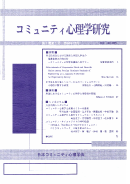Volume 7, Issue 1
Displaying 1-7 of 7 articles from this issue
- |<
- <
- 1
- >
- >|
Original Articles
-
2003Volume 7Issue 1 Pages 1-14
Published: December 15, 2003
Released on J-STAGE: November 23, 2021
Download PDF (726K) -
2003Volume 7Issue 1 Pages 15-34
Published: December 15, 2003
Released on J-STAGE: November 23, 2021
Download PDF (17027K) -
2003Volume 7Issue 1 Pages 35-46
Published: December 15, 2003
Released on J-STAGE: November 23, 2021
Download PDF (17993K)
Keynote Speech
-
2003Volume 7Issue 1 Pages 47-57
Published: December 15, 2003
Released on J-STAGE: November 23, 2021
Download PDF (17525K)
Symposium
-
2003Volume 7Issue 1 Pages 58-60
Published: December 15, 2003
Released on J-STAGE: November 23, 2021
Download PDF (3528K) -
2003Volume 7Issue 1 Pages 61-68
Published: December 15, 2003
Released on J-STAGE: November 23, 2021
Download PDF (13145K) -
2003Volume 7Issue 1 Pages 69-72
Published: December 15, 2003
Released on J-STAGE: November 23, 2021
Download PDF (6348K)
- |<
- <
- 1
- >
- >|
